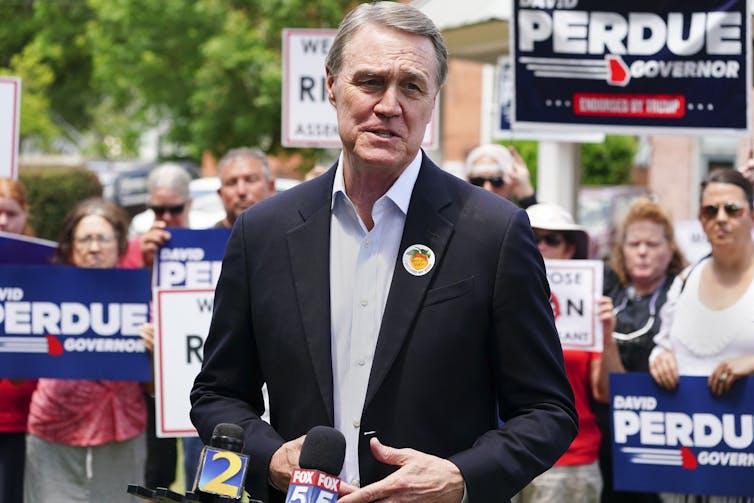
By Ian Anson
Over the past few months, many journalists and pundits have credited the power of Donald Trump’s endorsements with determining the winners of Republican primaries.
Trump has made 203 candidate endorsements in the 2022 election cycle so far, targeting state, congressional, gubernatorial and even local races.
Based on the numbers alone, receiving a “Trump bump” seems like a surefire way to win an election. So far, 94% of Trump’s favored candidates have won their Republican primaries.
But as a political scientist who studies voting and public opinion, I have my doubts about the true power of Trump’s endorsements. Instead, it is more likely that most of the candidates Trump has chosen to endorse were already on track to win their respective races.
Political science says that endorsements do occasionally matter for determining election outcomes. But in most cases, their effects are far less potent than commentators might expect.
This is because endorsements are not made in a vacuum. Much like the endorsements of interest groups and political parties, the so-called “Trump bump” is mostly a reflection of the attributes a candidate already had before the endorsement.
Backing the winners
Candidates’ electoral fortunes mostly stem from whether they’re incumbents, which political party they belong to, their ideology and their political savvy. In turn, these attributes also determine who gets endorsed by prominent groups and people.
For this reason, Trump’s endorsements are an excellent lesson in what scholars call “reverse causality.” This is what happens when people mistake a phenomenon’s effects for its cause, like thinking that people holding umbrellas have caused it to rain. In this case, reverse causality implies that Trump’s favorite candidates are not more likely to win because of his endorsement.
To be sure, candidate endorsements can act as valuable cues for voters seeking to make informed decisions. Voters might think to themselves, “If this person, whom I trust and like, supports a candidate, then I should trust and like the candidate too.” This is especially true in elections in which little is known about the contenders.

AP Photo/John Bazemore
Such mental shortcuts allow voters with limited knowledge of the candidates to vote according to their preferences. But in most cases, endorsements do little to persuade voters to shift their support from one candidate to another.
The real sources of the ‘Trump bump’
There are at least three other reasons that many of Trump’s favored candidates are finding success in 2022.
First, most of Trump’s endorsed candidates already hold office. This gives them a distinct electoral advantage. Only one of the congressional incumbents whom Trump endorsed lost in the primary. That candidate, Rep. Madison Cawthorn in North Carolina, chose to run in a new congressional district, partially scuttling his incumbency advantage.
The stellar performance of Trump-backed incumbents is unsurprising, because incumbents already have a nearly 100% chance of winning primaries. The rare primary upset of an incumbent, like the one that elected New York Democratic Rep. Alexandria Ocasio-Cortez in 2018, normally sends shock waves through the political landscape.
Of course, Trump has also endorsed some challengers. Research shows that challengers raise more money if they receive high-profile endorsements. Trump’s endorsement might have had a similar effect.
But longtime incumbents often have even deeper pockets, making them difficult for challengers to defeat. The record reflects this reality: Of the nine Trump-endorsed challengers who have gone up against incumbents in primaries thus far, only three have managed to win.
Trump endorsements are also likely determined by a candidate’s quality, which can be defined as the extent to which a candidate possesses the skills, reputation and resources – including money – to win elections. High-quality candidates normally contest only those elections they know they can win. Key endorsers like Trump stake their reputation on their support for candidates, meaning they are probably choosy about whom to endorse. This helps to explain why not all vocally pro-Trump candidates have received his official blessing.
Finally, a candidate’s ideology plays an important role in determining winners, losers and support from endorsers. Trump is likely to endorse conservative candidates who align with his policy preferences – though not always. Successful conservative candidates run in districts and states with many conservative voters. Trump’s endorsement will merely clarify these voters’ affinity for the candidate, while reaffirming others’ decision to vote for someone else.

Nathan Posner/Anadolu Agency via Getty Images
No endorsement, no problem for Republicans in ‘22
Before assigning Trump the credit for boosting candidates in the upcoming 2022 general election, observers should recognize the notorious difficulty of proving causation in the realm of electoral politics. 2022 is primed to be a banner year for Republican candidates, whether they receive a nod from Trump or not.
Midterm election years are almost always tough contests for the party of the incumbent president. Voters associate candidates down the ballot with the president’s performance in office. After an early honeymoon phase, presidential approval often slumps as midterm elections near, damaging the chances of congressional candidates.
A volatile economy is also bad news for the party of the incumbent. While presidents’ actions might not have much effect on national and global economic conditions, many voters blame the incumbent party anyway.
These factors combine to heavily favor Republican candidates this year. Trump’s endorsements are far less important for voting behavior than the political and economic context of this year’s elections.
Hopefully, when it comes time to discuss the reasons that some candidates won and others lost, commentators will keep these lessons from voting behavior research in mind.
![]()
Ian Anson is Associate Professor of Political Science at the University of Maryland, Baltimore County.





























Leave a Reply